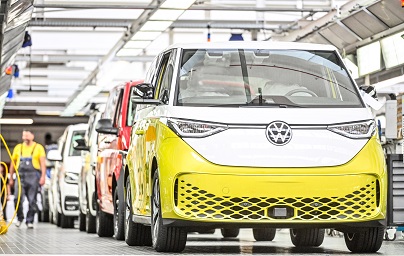Volkswagen Commercial Vehicles conducts its first autonomous driving tests with passengers in Munich
The development of autonomous vehicles for use in mobility and transport services is continuing to making significant strides with the major automotive manufacturers, including Volkswagen Commercial Vehicles, whose self driving electric ID Buzz AD (Autonomous Driving) is already on the road to series production readiness and will be taking to the roads for the first time over the next few weeks, carrying decision-makers from politics, public authorities and business as well as media representatives so that they can get an idea of the vehicle’s control capabilities.
Volkswagen’s test programme has also launched in parallel in Austin, Texas, USA. The AD vehicle development process is focused on the vehicle’s commercial use in urban centres in Europe and North America, both for ridesharing schemes and transport services.
Christian Senger, member of the Board of Management responsible for development of autonomous driving at Volkswagen Commercial Vehicles, explains that expanding the company’s autonomous vehicle programme to North America is the next step in VW’s global strategic roadmap and the result of a long- term investment.
“This will help us to test, validate and refine the technology on American roads as well with the aim being to expand both the establishment of commercially available transport services and the varied mobility portfolio of the Volkswagen Group to continental USA,” he says.
Driverless Technology
The electric ID Buzz vehicles are equipped with a self-driving system from the technology company Mobileye. The growing test fleet collects data on miles driven in a variety of driving scenarios. Each of the vehicles, which are classified as level 4 vehicles according to the SAE standard, is equipped with cameras, radar and lidar technology. During the test phase, all vehicles are occupied by supervising human drivers at all times. The large-capacity model offers space for four passengers and can be produced in large quantities once it is ready for series production in order to meet growing mobility and transport requirements.
Volkswagen believes that its experience of understanding what passengers want and what operators need is an important aspect for the development of these fleets. The group’s subsidiary MOIA has been on the market as a mobility provider of ridesharing services since 2019 and has transported more than 8.5 million passengers to date, representing a knowledge base that has also contributed to the data required for the daily development activities of the ID Buzz AD.
Further knowledge will be gained through the launch of the testing programme in Texas at the Volkswagen Group of America, marking a further boost for the VW Group’s global research and development efforts for autonomous vehicles. The American wing will lead the strategy and business development in the US and has established a local subsidiary to support the roll-out of its autonomous vehicle programme with teams in Belmont, California and Austin, Texas.
Unlike in Germany, where MOIA will be the first to use autonomous vehicles, Volkswagen will not operate autonomous driving services itself in the US in the future; instead, this will be done by external companies from the mobility and transport sector.
- UK manufacturing steps up to COVID-19 crisis - April 2, 2020
- Clustering Innovation - March 12, 2020
- A Global Monitor - March 6, 2020

